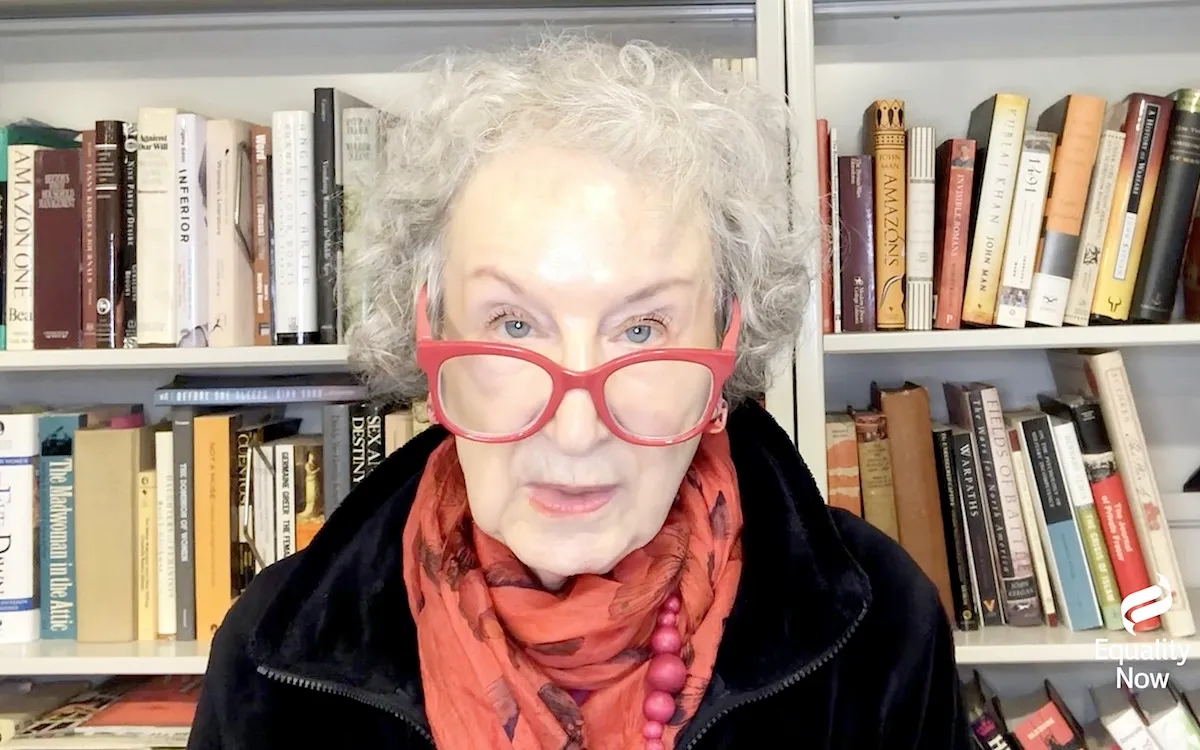Margaret Atwood has taken a giant leap farther into the camp of writers who simply refuse to let us enjoy their work in peace by tweeting out an op-ed from the Toronto Star Tuesday, in which writer Rosie DiManno asks, “Why can’t we say ‘woman’ anymore?”
The article is behind a paywall but let me save you from your curiosity: It’s nonsense. There is absolutely nothing new in the entire essay, no new insights, just the same tired handwringing over the evolution of language to be more inclusive—and, it needs to be noted, more accurate.
Most of DiManno’s article takes issue with the shift a lot of institutions are making towards inclusive language in the conversation around reproductive rights, using terms like “pregnant people” instead of “pregnant women.” This, she says, is “all directly a phenomenon resulting from trans activism run amok.”
I’ve argued in favor of this shift in language right here on this site because it’s important and honestly, it costs cisgender women like myself absolutely nothing to embrace this language. How does it hamper my access to healthcare to refer to it by gender-neutral terms? It absolutely doesn’t, but it does help increase access for trans and nonbinary people, many of whom (as many as a third according to some polls) do not feel comfortable seeking healthcare for fear of being discriminated against.
DiManno tries to dismiss the needs of trans and nonbinary people as inconsequential. “Women have abortions. Or, I suppose, in the tiniest of numbers, people born with female genitals who identify as male or fluid can terminate a pregnancy,” she writes.
I do wonder what she thinks that number is. Because the number of non-cis people is rapidly increasing with every generation and according to one recent GLAAD study, 12% of people aged 18-34 in the U.S. identify as something other than cisgender.
12% is not a tiny number by any means. At the point that 12% of the population doesn’t fit the term used to describe them, it’s time to adjust the term. Which is why this shift in language isn’t just about inclusivity, it’s about accuracy. Trans and nonbinary people can and do get pregnant, they get breast and ovarian cancer, they have all sorts of reasons to need access to affirming health care.
This shift in language is most definitely happening in conversations around healthcare. But DiManno makes a giant leap when she extends the issue to other aspects of “womanhood.” This is how she opens her essay:
“You Make Me Feel Like a Natural Person with a Vagina.”
“Man! I Feel Like a Person who Menstruates”
“Oh, Pretty Person with a Cervix”
Apologies to Aretha Franklin, Shania Twain and Roy Orbison, but this appears to be where we’re heading if language radicals get their way.
That, it should be obvious, is ridiculous. While I would be more than happy to see less heteronormativity in pop music, what DiManno describes simply isn’t happening. She’s conflating an institutional conversation with a personal one, and the result is pure strawman fearmongering.
“Why can’t we say ‘woman’ anymore?” her headline reads. You can. Of course you can. No one is trying to tell anyone not to call women “women.” We’re just asking not to use that term to describe people who aren’t women. Why is that so threatening?
“CONSTABLE CONSTABLE PLEASE HELP someone… called me… a p*rson … in one specific setting so that their language would more accurately describe what they were trying to talk about”
— Alexandra Petri (@petridishes) October 19, 2021
DiManno also tries to claim that women are being erased because these conversations aren’t happening for men in the same way. “Why ‘woman’ the no-speak word and not ‘man?'” she asks. “Why not ‘persons who urinate standing up’ or ‘people who eject semen?'”
All I can say is that it’s very clear that DiManno hasn’t put much effort into researching the issue she’s writing about.
Planned Parenthood has little signs in the bathroom explaining how to collect a urine sample and it uses “people with vaginas” and “people with penises.” There are other examples of cis men’s bodies being described this way as well. pic.twitter.com/GL4SF44dcu
— Derailed 7000 series tran (@transscribe) October 19, 2021
As for Atwood’s decision to share the article, it’s disappointing but not exactly surprising for anyone who’s been paying attention to her recently. Just as JK Rowling’s TERFdom took a lot of people by surprise with some recent especially egregious tweets, when, in reality, she had been leading up to full-blown transphobia for years, the Handmaids Tale author has been circling these ideas for quite a while.
For one thing, in 2018, Atwood signed that horrible Harper’s Magazine letter (along with Rowling) that hinted at vague notions of cancel culture and political correctness run wild but seemed to be centered around anti-trans dog whistles.
She been on some bullshit but because YT women wanted to hang onto her & her ~dystopian~ portrayal of YT ““womanhood””, now we’re here 🤨https://t.co/cMbA276MVu
— Clarkisha (@IWriteAllDay_) October 19, 2021
(image: Getty Images/Getty Images for Equality Now)
Want more stories like this? Become a subscriber and support the site!
—The Mary Sue has a strict comment policy that forbids, but is not limited to, personal insults toward anyone, hate speech, and trolling.—










Published: Oct 19, 2021 05:57 pm